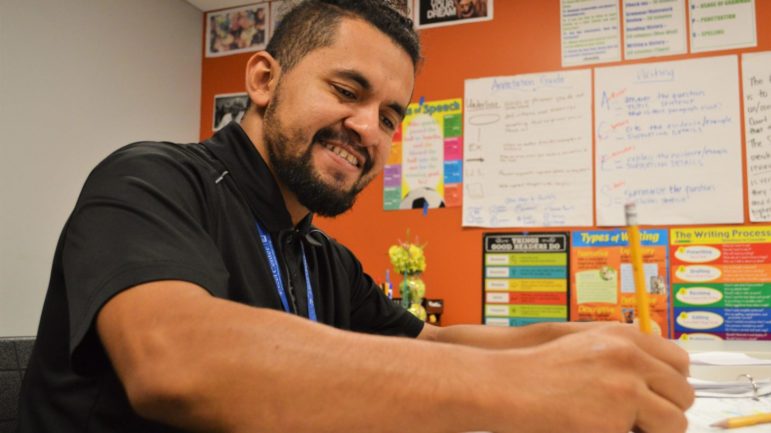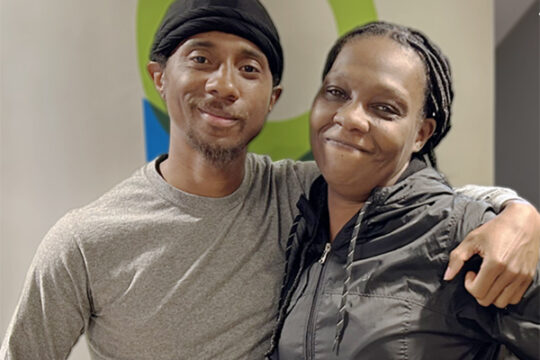From Construction Site To Classroom: Salvadoran Immigrant Now Building A Better Life
By Aditi Malhorta

WASHINGTON, D.C.— Josue Lemus’ first job in the United States was at a construction site in Maryland. Twenty-one at the time, the Salvadoran immigrant went to work as soon as he set foot in the country – quite literally, the day after he arrived.
At the site, Lemus would start early. He got there at 5:30 a.m. every day and spent the rest of his workday hauling bricks from one location to another, passing them on to the skilled bricklayers.
Once home, Lemus would stay quiet in his room, a tiny closet in a small two-bedroom apartment occupied by another family of Salvadoran immigrants. He barely had room to turn over in his sleep, said Lemus.
Despite his halting English and glaring gaps in education, Lemus’ first job in America allowed him to survive financially in a new country, one vastly different from his own. He was grateful for that, he said.
But from day one, he knew the construction site wasn’t his place. Back home in El Salvador, Lemus had worked low-wage, unskilled jobs since he was 8. He’d helped his mother with a vegetable stall she owned in their local village market. As a teenager, he’d worked at bars in San Salvador, the capital city, serving food and drinks.
Now that he was in the U.S., Lemus hoped for better opportunities, and a brighter future. “I just didn’t picture myself working as a construction worker,” he said.
Still, he labored in that job for three years before moving on to another unskilled job in nearby Washington, D.C. He cleaned the kitchen floor at a McDonald’s, doing what he called all the “dirty stuff.”
By that time, he’d realized that to get a job where he felt valued, challenged, and “like a professional,” he’d need to polish his English-speaking skills and get at least a high school diploma – all while staying employed so he could pay his bills.
In 2011, Lemus completed an English as a Second Language program at a high school in D.C. But at work, he frequently lost opportunities to those who had graduated from high school. “I had skills and work experience, but I was missing a high school diploma,” Lemus said.
In Washington, options for adults to pursue a high school diploma are limited, even though the district is home to some 90,000 adults who are functionally illiterate – that is, they lack the skills to perform everyday tasks such as reading or filling out job applications.
In the fall of 2017, Lemus followed some information on social media to the only high school in Washington offering high school diplomas to adults of all ages: the Excel Center.
Once there, Lemus excelled.

In 2008, the year he arrived in the United States, about 55 percent of the 938,000 Salvadoran-born residents age 25 or older lacked a high school diploma or its equivalent. Among all foreign-born adults, the number was much lower: 33 percent, according to an analysis by the Migration Policy Institute, a D.C.-based think tank.
This lack of education often restricts Salvadoran immigrants to manual labor, domestic work, or food service. Despite the nature of work, earning a living wage takes center stage for many immigrants as soon as they arrive.
For adult students like Lemus, employment is a must. At Excel, he found staff who were well-versed with his need to balance school and work. A combination of in-class and online instruction allows students to work within their own schedules and exercise the flexibility they need to maintain that balance.
With support from staff and administration, Lemus could keep his job at Cosi, a fast-food restaurant where he’d started work in 2013 and worked as a manager until July. He also was encouraged by his Excel Center life coach to prioritize academics, even though he was pressed for time juggling his school work and his duties at the restaurant.
Lemus took that seriously and started taking night shifts so he could attend school during the day. He said he worked doubly hard to stay on track.
It’s something that comes naturally to him, thanks to a “turtle’s shell” that has been growing with him since childhood. The tougher the life experience, the stronger the shell.
“You know the animal turtle?” Lemus asked excitedly one afternoon between Excel classes and work. “Ever since I was a child, I have been building the hard shell of a turtle,” he said. “No matter what, I stay strong.”
In the two years he’s been at Excel, Lemus has won many awards – for perfect attendance, schoolwide professionalism, leadership, and perseverance. He is on track to graduate in January 2020 with a high school diploma and a postsecondary certification in hospitality.
His biggest reward, however, has been the multicultural learning environment at the Excel Center where he and other adult students fit.
“There is such a huge education system in this country,” Lemus said. “We shouldn’t be fighting to fit into it. In fact, we should have many options like the Excel Center.”



